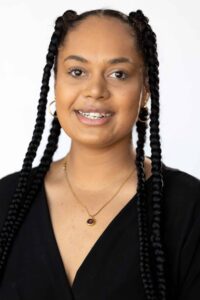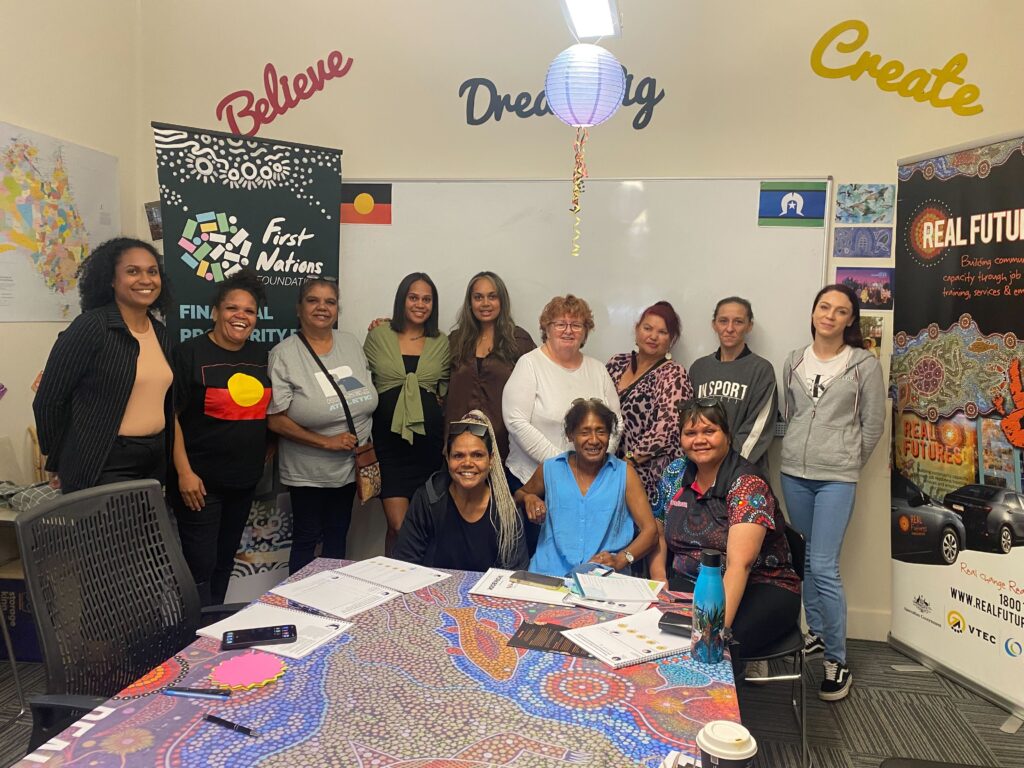Rich Blak Women is a truly unique podcast that follows stories from Aboriginal and Torres Strait Islander women – “rich in culture, value and mindset.” The pod aims to deepen awareness about the unique economic inequities’ First Nations women face, explore success and connection to culture, empower financial wellbeing through shared experiences and learnings, and build community and allies. BroadAgenda’s editor, Ginger Gorman, had a chat with podcast host Larisha Jerome.
Let’s start off by asking you to tell us a bit about who you are and where you come from.
I am a proud Jarowair, Wakka Wakka, and Wulli Wulli woman with strong family ties to Southeast Queensland who grew up on Darug Country in Western Sydney.
I have an extensive background working in banking, health and government (Indigenous Affairs), and the not-for-profit sector, specialising in women’s health and women’s community legal services in financial abuse prevention.

Larisha Jerome, host of the “Rich Blak Women” podcast. Picture: Tomorrow Money
As the lead of First Nations Foundation’s Indigenous Women’s Financial Wellness initiative, I aim to redress the economic injustice that Indigenous women face, empowering them to achieve financial wellness and economic independence. This role has led to immense personal and professional growth, opening doors I only dreamt of as a child.
Motivated by my family, community, and Aboriginal and Torres Strait Islander girls and women, I find great reward in hearing their stories and being a part of their learning experience.
My career highlight to date has been leading First Nations Foundation’s Indigenous Women’s Financial Wellness initiative, and hosting the Rich Blak Women podcast, developed with the vision of long-term financial prosperity for all Indigenous Australian women, and intergenerational wealth transformation across Indigenous families and communities.
For people who haven’t heard your podcast, “Rich Blak Women”, what’s it all about?
Rich Blak Women is a ‘modern day’ yarning circle to amplify the voices of Aboriginal and Torres Strait Islander women from across the country which aims to deepen the awareness about the unique economic inequities First Nations women face, to follow their stories of success, connection to culture and empower financial wellbeing through our lived experience and perspectives.
It also highlights that all First Nations people have different lived experiences and different perspectives which is so inspiring to hear.
When you say the word “rich” you’re using it in a way that is more than about money. For example, you discuss topics like: knowing your worth, setting boundaries and speaking up, and Indigenous representation. Tell me about how you interpret the word “rich.”
Being rich, is just a state of being and a state of mind. As First Nations people we have been rich in culture, wisdom, and community and our elders have demonstrated over 60,000 years of survival.
The perception of wealth and the way we value money is very different and before colonisation there was no need for money whatsoever, we lived off the land and preserved it and didn’t accumulate beyond what’s necessary. There is more focus on the collective of family and community.
Money is just energy. A very generous energy that allows us to provide for ourselves, our families, and communities. Not just the bare necessities but luxuries and experiences that make life a lot more fun. We have been in “survival” for way too long and abundance is our birthright and comes in many forms and supports us to thrive, build prosperity and generational wealth in all aspects of life.

First Nations Foundation’s Larisha Jerome and Destiny Dewis delivering a women’s workshop in Darug Country Western Sydney in partnership with Real Future Women’s Second Chance Education Hub. Picture: Supplied
Why do Indigenous women need different types of discussions around money and finance?
Due to many economic disadvantages that we face as First Nations people within this country which includes unemployment, financial problems, poverty, and economic exclusion it’s so important that we create trauma informed and strength-based practises through all the work that we do.
Through the Indigenous Women’s Financial Wellness initiative, we always bring it back to our core focus of financial literacy education. We focus on financial wellness and your overall holistic financial health, and how that relates to our everyday life mentally, spiritually, and physically.
Not because of lack of intelligence but lack of opportunities that have systemically affected the lives of First Nations women we are now finding more women stand in their power, release money shame, overcome self-limiting beliefs, and embody the abundant mindset that empowers our communities to economic independence.
If you imagined a world where your work here was done, what would that look like?
Land back, economic independence, generational wealth, and prosperity for all First Nations people. A world where we can experience abundance in all forms and not just surviving but thriving and ensure the safety and security for all our children, families, and communities.
You’ve got such a variety of guests (from so many different ages and backgrounds.) How do you choose guests?
Many of the guests have been an inspiration to me personally, I heal within community and by learning, listening, and hearing lived experiences from all different women across country it’s empowered me through all the work that I do now and continue to do.
It’s also important to note there are women in all their respected fields of work, with so much knowledge, wisdom, and power within their respected communities so it’s truly an honour to be able to yarn with every single one of them. Every single First Nations woman’s story is sacred, important, and inspiring and I’m certain for everybody First Nations or not, will resonate with an episode in some capacity.
This is your second season of Rich Blak Women. What have you learned so far? What moment has surprised you the most?
What I’ve learnt is that we don’t have to make talking about money complicated, bringing it back to spirituality and the way money makes us feel is so powerful.
The number of women who have personally reached out to me and said that they’ve resonated with something we’ve spoken about on a podcast episode and for younger girls and women who hear these stories knowing that they too can achieve the unimaginable and that no dream is too big to achieve.
It’s important to remember that for some of us, this is the first time ever we are having conversations about money, releasing money shame, and finding empowerment through sharing our lived experiences because empowered women empower others, and that knowledge is then passed through all our communities and generations.
How is the podcast helping you build allies?
Allies are incredibly important for social, economic, cultural, and political advancement for First Nations people and of course First Nations women. It’s so important that our allies can listen and learn from all our conversations from a grassroots First Nations perspective.
- Picture at top: First Nations Foundation’s Larisha Jerome and Jordy Dwyer delivering a financial literacy workshop in Nhulunbuy NT in partnership with Laynhapuy Homelands Aboriginal Corporation. Photo: Supplied
The post Indigenous women yarning about finance appeared first on BroadAgenda.

